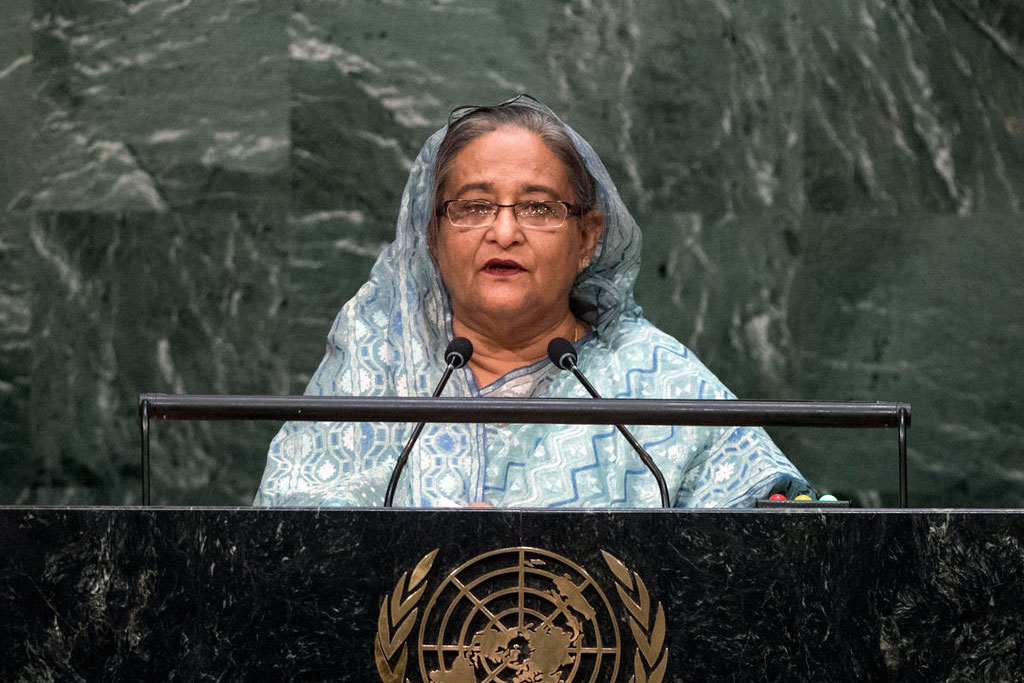The world must demand rightful citizenship of Myanmar for the Rohingya

As a citizen, I feel the upcoming speech of Prime Minister Sheikh Hasina to the United Nations General Assembly is a critical opportunity to highlight the Rohingya crisis on the world stage.
Since August 25, Bangladesh has been consumed by the largest refugee crisis since its independence in 1971, with over 410,000 refugees entering the country from Myanmar due to persecution by the Myanmar military.
We are witnessing the mass expulsion of a community that holds a remarkable heritage in the historic Arakan region of Myanmar. The UN has affirmed that Myanmar has committed ethnic cleansing. The United Nations High Commissioner for Human Rights has demanded the right of return under the cardinal principles of international law enshrined in the Geneva Convention.
I would begin by addressing Daw Aung San Suu Kyi. Daw Suu Kyi has insisted on upholding the rule of law. Where is the rule of law in Myanmar when an entire community is placed under legal apartheid by the 1982 citizenship law?
How can Suu Kyi make meaningful reform in Myanmar with the military retaining control of key ministries like home, defense, and border affairs; 25% of seats in parliament, and one vice president under the 2008 constitution?
Why should those born in Myanmar not be entitled to that country’s passport? Why should residents of Myanmar need a permit to travel within the country? Unjust laws are no laws at all.
I would tell the General Assembly that the Rohingya are the native community of Arakan whose roots date back over a millennium in that land
Bangladesh must demand the restoration of Rohingya human rights. If Suu Kyi is unable to fulfill these basic humanitarian principles, she should resign from the power-sharing diarchy with the Myanmar military.
As her fellow Nobel Peace Prize-laureate Muhammad Yunus noted, the world would like to see Suu Kyi at the peace level, not at the hatred level.
Bangladesh must firmly point out that no amount of strategic geopolitics can trample the importance of saving a population under genocide. Yes, there has been militancy and terrorism. But security issues should be left to be firmly handled by law enforcement agencies within the principles of due process and civic military doctrines.
The general population cannot be targeted for the sins of a few. Bangladesh should also question whether the projects taken up by China and India in Rakhine State involved Rohingya forced labour.
Bangladesh should question the sale of arms to Myanmar by countries like Russia, which may have been used to target the civilian population.
Bangladesh must point out that much of Myanmar remains embroiled in ongoing ethnic conflicts including the Shan, Kachin, Kayah, Chin, Mon, and Kayin peoples. The continuance of these conflicts harms the stability and potential of our neighbourhood.
I would tell the General Assembly that the Rohingya are the native community of Arakan whose roots date back over a millennium in that land. I would quote the Rohingya identity in their own words.
MA Gaffar, a member of the Myanmar constituent assembly, presented a Memorandum of Appeal to the government in 1949, stating: “We the Rohingyas of Arakan are a nation. We maintain and hold that the Rohingya and Rakhine are the two main nations in Arakan.
“We are a nation of nearly 900,000, which is more than sufficient for the population of a nation; and what is more, we are a nation according to any definition of a nation, with our own distinctive culture and civilisation, language and literature, art and architecture, names and nomenclature, sense of value and proportion, legal laws and moral codes, customs and calendar, history and traditions, aptitude and ambitions; in short, we have our distinctive outlook on life and of life.
“By all canons of international law, the Rohingyas are a nation in Arakan.”
I would point out the election of Rohingya legislators since British rule, including one of Myanmar’s first female MPs. I would note the Rohingya participation in Myanmar’s pro-democracy movements.
The world is witnessing a grave humanitarian crisis in the northern townships of Rakhine state, which can escalate into a Frankenstein threat to regional stability.
The world must demand the return of full citizenship and freedom for the Rohingya. A UN administration should be established if necessary, to bring back peace.
Umran Chowdhury is a law student in the University of London International Program.
Courtesy: Dhaka Tribune